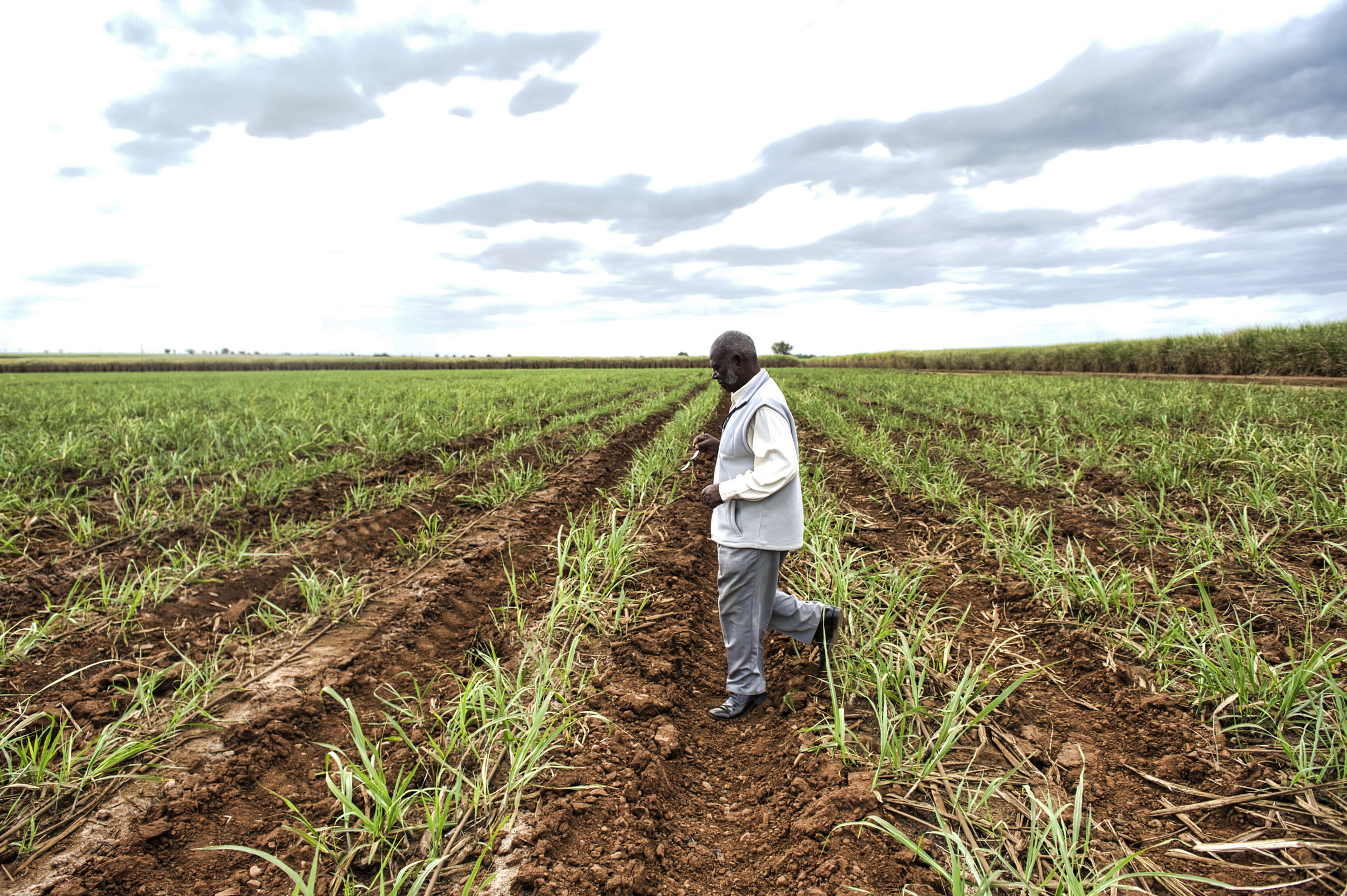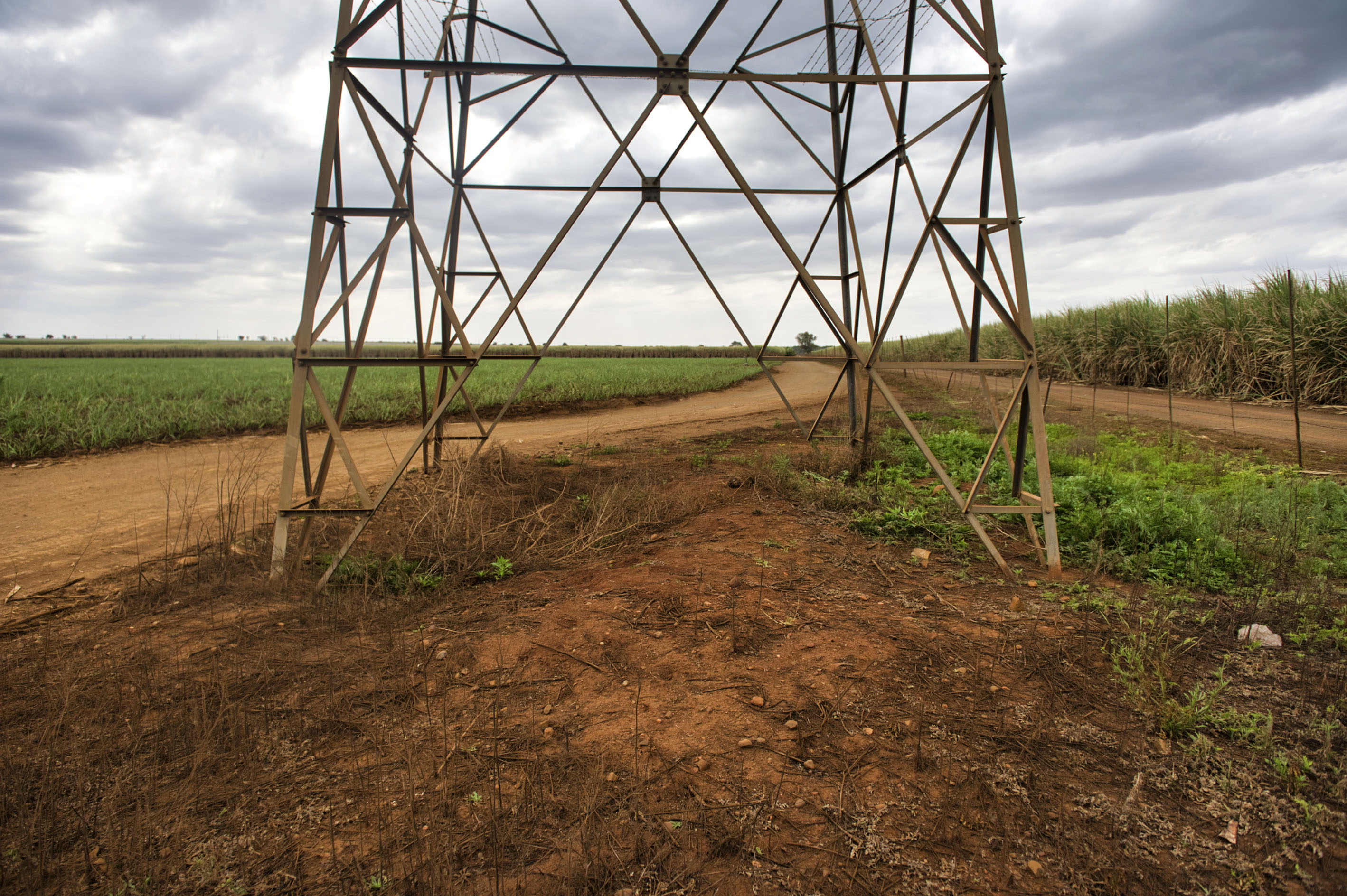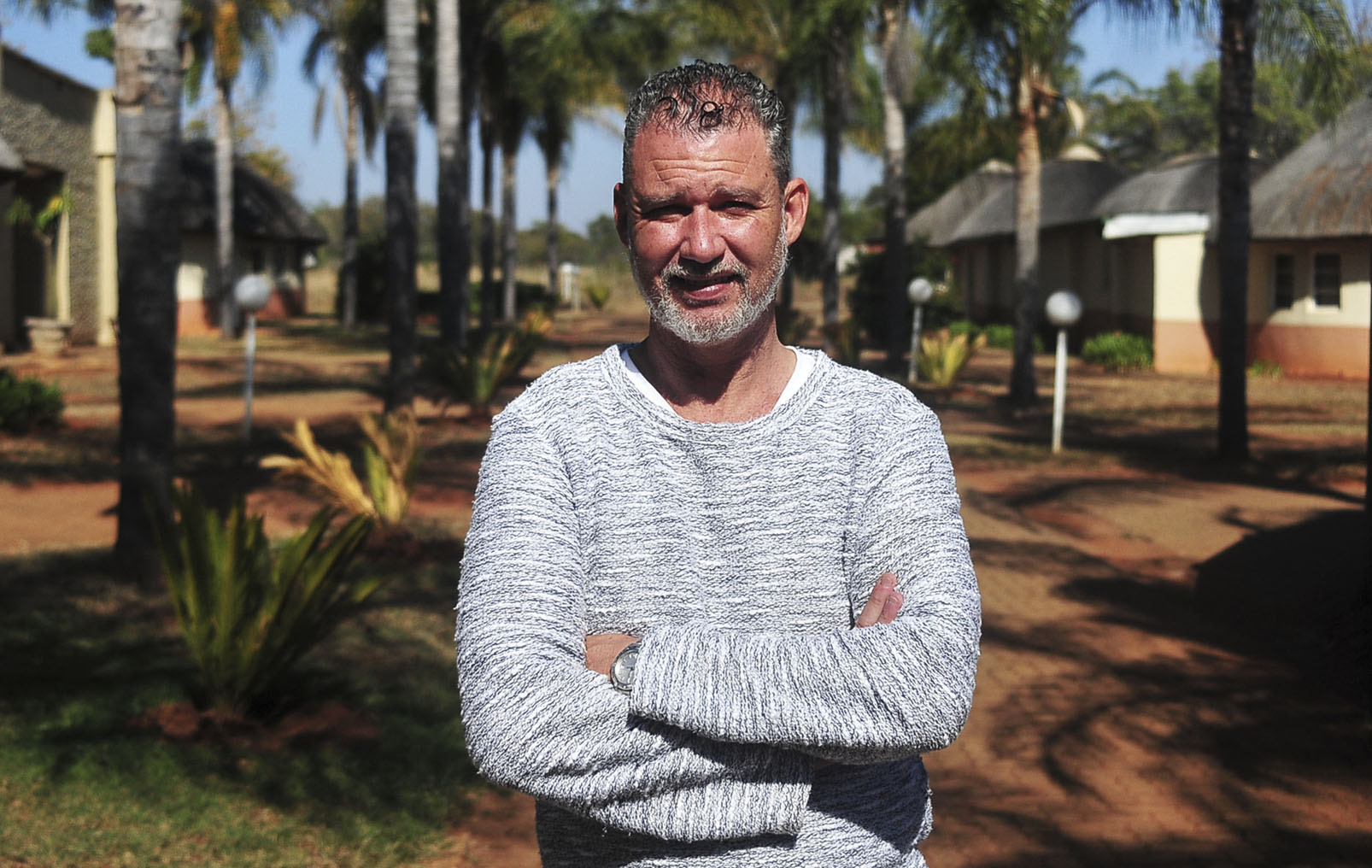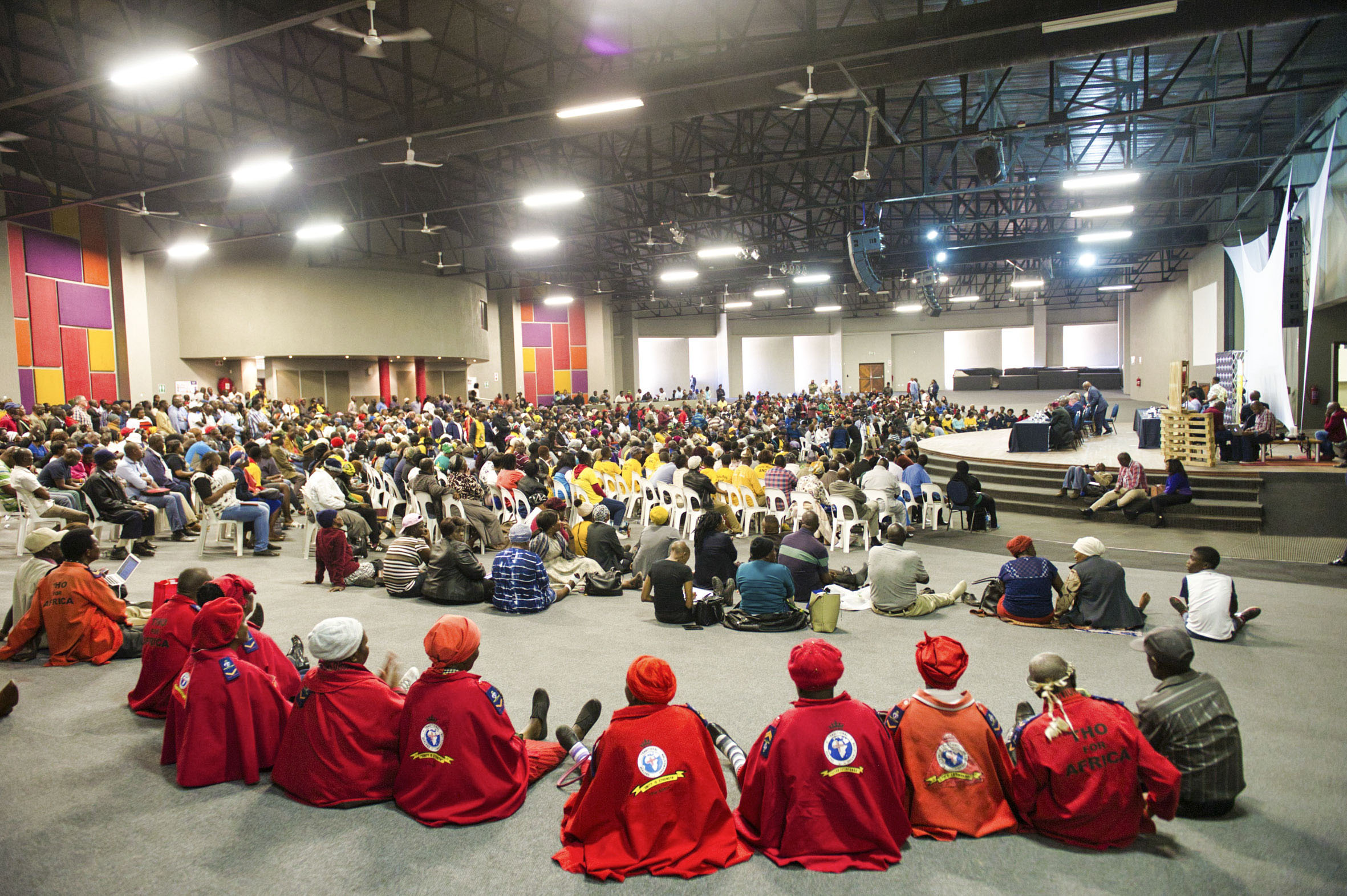Land hunger: Musa Makhanya delivers his father’s message at the hearing.
Read the Mail & Guardian’s full coverage of the constitutional amendment hearings here.
A pylon towers over the grave of Langwane Jandluma Makhanya on a sugar cane farm in Ten Bosch.
His son, 93-year-old Mthakathi Simon Makhanya, wanted to tell the parliamentary joint constitutional review committee in Mbombela (formerly Nelspruit) about how the loss of land led to the heartbreak that eventually caused the deaths of both his parents.
He also wanted to say how his family was plunged into a life of poverty, misery and deprivation after they were forcefully removed from their land in 1954.
 Pylon as tombstone: Mthakathi Simon Makhanya visits the gravesite of his father, Langwane Jandluma Makhanya, on what used to be the family farm where cattle and goats would graze freely (Delwyn Verasamy)
Pylon as tombstone: Mthakathi Simon Makhanya visits the gravesite of his father, Langwane Jandluma Makhanya, on what used to be the family farm where cattle and goats would graze freely (Delwyn Verasamy)
But Makhanya was too sick to travel to Mbombela for the public hearings on Monday. Instead, he went to hospital and sent his son, Musa, to present his case to the committee, which was conducting public hearings into proposed amendments to section 25 of the Constitution in Mpumalanga and Free State this week.
On Tuesday, a day after Musa delivered his father’s message to the hearings, Makhanya stood teary-eyed over the grave of his father.
His eyes wandered around the landscape of Lilly Pond farm, where sugar cane stretches as far as the eye can see, covering the land in a blanket of green.
He recalled an incident back in the late 1990s, when the family visited the farm after lodging a claim to the 400-hectare property with the Commission on Restitution of Land Rights.
They were driving around in search of Langwane’s grave when one of his sons banged on the top of the bakkie, signalling the driver to stop. He had seen what appeared to be an apparition dressed in a white robe floating near the pylon. It later transpired that this was the exact spot where Langwane lies buried.
“I am really sad. But, when I’m here, I feel very strong,” said Makhanya.
 In 1954, government bulldozers moved in and the Makhanya family was dumped ‘in the bush’ more than 50km away. (Delwyn Verasamy)
In 1954, government bulldozers moved in and the Makhanya family was dumped ‘in the bush’ more than 50km away. (Delwyn Verasamy)
He casts his cataract-glazed eyes into the distance, looking into the past, a blissful time when more than 100 head of his family’s cattle and goats grazed on the fertile land. He smiled to himself. Sweet memories of a yesterday long gone have not left him.
“My father’s cattle grazed all over this place. They were so many he employed three grown men to look after them,” he said with pride.
But memories of the injustice have ruined the sweetness. In 1954, earth-moving equipment and government trucks violently ended the peace on the Makhanya farm. They were forcibly removed and dumped in the bush 50km away to the south, near the border with Swaziland.
They ended up on tiny plots in a new area called Masibekela and were not allocated farming land. This forced many of them to work for a pittance as labourers on farms that once belonged to them but were now owned by whites.
The intense sadness he feels is expressed in the deep frown on his dark ebony face that is lined with a neatly cropped, snowy moustache.
“They just dumped us in the bush. We had nothing. It was just a bush with wild animals and snakes. We could not plough because they just cut up this land into small pieces and said we must build our own houses,” he said.
As a result of the loss of his family land, he found work herding cattle on different farms. His mother, Mevase Sibuyi, who had never been sickly, did not stop crying after the loss of their land and died in a hospital in Pretoria in 1962. The family never got to bury her.
Musa has recently discovered she was given a pauper’s burial in Mamelodi West.
This has also weighed heavily on Makhanya over the years.
But it was not the first tragedy. In 1938, all the family’s livestock was killed by government officials when there was an outbreak of foot-and-mouth disease.
Devastated by the turn of events, Langwane spent most of his days sitting in the shade staring at the spot where his wealth lay buried in a mass grave. His health deteriorated until his death in 1945.
Makhanya said that, although Parliament enacted the Restitution of Land Rights Act in 1994, it has not helped his family to recover their land or have their dignity restored. He hopes that, if section 25 is amended, it could help him to get his land back before he joins his ancestors in their eternal sleep.
“The whites never bought this land. After Hitler’s war, the whites were given farms around here. The blacks who also fought in the war lost their land and were given only coats and bicycles. They [white people] are wrong because they never bought the land,” Makhanya said.
The hearings in Mpumalanga this week and Limpopo last week exposed the deep pain of rural people who suffer human rights abuses as tenants on white-owned farms or under the yoke of traditional leaders who are battling with municipalities for control of land.
The committee heard harrowing accounts of white farmers who refused farm tenants and people who were forcibly removed from land under apartheid access to ancestral graves, many of which have been desecrated by the farmers.
It also heard how coal-mining companies in the Mpumalanga Highveld are waging a war of terror, demolishing homesteads, polluting water sources and violating tenure rights.
In the real world, the inequality between white and black people remains a glaring reality but in the hearings the battle for land forced wealthy white farmers to sit next to and line up alongside poor, landless farmworkers and people who live in shacks. Skin colour and social status had no bearing on the proceedings.
Vincent de Agrella was among the few white people who participated in the hearings. On Saturday, he sat nervously among a crowd of mainly black people, who expressed their anger and resentment against whites and their hatred of Jan van Riebeeck and the three ships that landed at the Cape of Good Hope in 1652.
 Vincent de Agrella is struggling to run a Makhado hotel built on disputed land (Lucas Ledwaba/Mukurukuru Media)
Vincent de Agrella is struggling to run a Makhado hotel built on disputed land (Lucas Ledwaba/Mukurukuru Media)
He said it was the first time he had attended such a public forum and, although it was nerve-racking, it was an eye-opener and made him aware of the anger brewing among landless black people.
De Agrella and his family bought the Adam’s Apple hotel near Makhado (Louis Trichardt) in 1998. In 2005, the farm became the subject of a land claim. De Agrella and the claimants entered into negotiations and agreed that he could lease the land on which the hotel is built. Part of the deal is that he trains local youths. He wishes to expand the operation but he has not been able to make any progress because the land claim remains unresolved.
De Agrella told the committee that he agrees that all the country’s citizens have a right to land but argued that amending the Constitution would not address the issue of land hunger because the government is already sitting on land that it has failed to distribute.
He blamed corruption, the lack of urgency by the Commission on Restitution for Land Rights and lack of political will for the slow pace of land restitution and reform.
Mpumalanga farmer Johan Holtzhauzen said his family is in the process of transferring 111 hectares of land to the six black families who live on his farm. He said that, although he recognises the importance of restitution, he is opposed to expropriation without compensation because it would make it impossible for existing and startup farmers to get financial support if individual property rights are not protected.
 Traditional healers air their views on expropriation. (Delwyn Verasamy/M&G)
Traditional healers air their views on expropriation. (Delwyn Verasamy/M&G)
The hearings have also brought to the fore the uneasy tension that exists between residents and traditional leaders. In both Limpopo and Mpumalanga, traditional leaders said that, although they support the motion, they wanted land transferred to them rather than to the state or individuals.
Sililo Mahlangu, a senior representative of the AmaNdebele nation under King Mabhoko III, told the committee in Mhluzi in Mpumalanga on Wednesday that the government has failed to fulfil promises made by Nelson Mandela that land would be restored to traditional leaders. It was the amakhosi’s view that the people who were dispossessed of land were under the leadership of traditional leaders and therefore the land should be restored to them.
But many people, especially youths, said individual families should be given the title deeds and not the amakhosi.
A participant in the hearings in Thohoyandou summed up the growing opposition to traditional leaders and their role in land ownership by questioning why they were continuing to sell tribal land.
He said commoners are caught in the crossfire between the amakhosi, politicians and the government. He also questioned why chiefs are charging people who want land for business exorbitant amounts and why there is no accountability for the money raised by selling land.
Resentment about this has been brewing for years. Maskanda music legend Phuzekhemisi captured this collective ire of rural folk in his 1992 hit Imbizo. In it he questions why traditional leaders are forcing people to pay annual tribal levies.
The hearings also provided insight into how izinyanga, sangomas and herbalists, who rely on plants to cure people, are affected. Studies have shown that the majority of black South Africans rely on traditional medicine.
Sangoma Fikile Kunene said she supports expropriation and hopes it will help to resolve the difficulties faced by many of her colleagues who want access to sacred sites, which are on privately owned land. Owning land would also afford traditional healers the opportunity to grow the plants, she said.
The hearings are also serving as a barometer for political parties to gauge their support. The Economic Freedom Fighters (EFF), which appears to have done more groundwork than the other parties to prepare its supporters for the hearings, resonated with many of those who attended, with both young and old pledging their loyalty to party leader Julius Malema, who is a member of the parliamentary committee. Some of the elders became emotional, telling the committee they never thought they would ever get to see Malema in the flesh.
Congress of the People leader Mosiuoa Lekota, who clashed with Malema in Limpopo last week, has had a torrid time, and many people have accused him of selling out his principles and black people by joining ranks with white-aligned political parties and farmers’ organisations that oppose expropriation without compensation.
The ANC, which didn’t have much of a presence in the Limpopo leg of the hearings, enjoyed huge support in Mpumalanga.
The Democratic Alliance also had a presence among black youths, who appeared to be more interested in the free blue T-shirts and the party’s sponsored meals at lunchtime than in the deliberations.
But if the sentiments expressed during the hearings are anything to go by, it appears the EFF and Malema, who was even compared with the biblical leader Moses by one speaker, have won the hearts of many land-hungry black people, who hope they can deliver on the promise of restoring land to them. — Mukurukuru Media